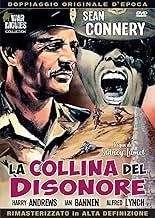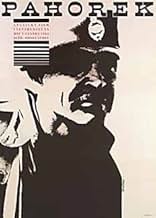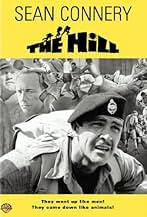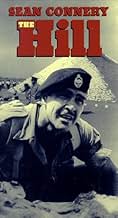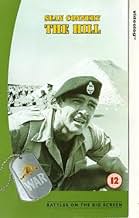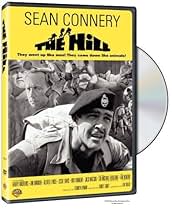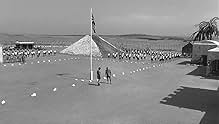AVALIAÇÃO DA IMDb
7,8/10
16 mil
SUA AVALIAÇÃO
Em uma prisão militar do Norte da África durante a Segunda Guerra Mundial, cinco novos prisioneiros lutam para sobreviver às punições brutais e aos guardas sádicos.Em uma prisão militar do Norte da África durante a Segunda Guerra Mundial, cinco novos prisioneiros lutam para sobreviver às punições brutais e aos guardas sádicos.Em uma prisão militar do Norte da África durante a Segunda Guerra Mundial, cinco novos prisioneiros lutam para sobreviver às punições brutais e aos guardas sádicos.
- Ganhou 1 prêmio BAFTA
- 4 vitórias e 6 indicações no total
Michael Redgrave
- The Medical Officer
- (as Sir Michael Redgrave)
Michael Hawkins
- Prisoner
- (não creditado)
James Payne
- Man in Prison
- (não creditado)
Robert Royal
- Prisoner
- (não creditado)
Harold Sanderson
- Officer
- (não creditado)
Enredo
Você sabia?
- CuriosidadesFilming took place in Almería, Spain in a sandy wasteland called Cabo de Gata starting in September 1964 for five weeks on location. An old Spanish fort in Málaga was used for the prison.
Many people associated with the production had regarded the filming as pleasant, despite difficult conditions---The temperatures rarely fell below 115 degrees Fahrenheit (46 degrees Celsius), and despite the 2,000 gallons of pure water that were shipped in for the crew, almost everyone succumbed to dysentery during the shoot.
- Erros de gravaçãoThe first time the new arrivals are shown around "the hill" by Staff Williams, the shadow of the rig is clearly visible as the camera performs a 360 degree shot from the top of the hill.
- Citações
Trooper Joe Roberts: We're all doing time. Even the screws.
- Versões alternativasColorized version was broadcast over TNT Network June 7, 1989.
- ConexõesFeatured in The Sun... the Sand... the Hill. (1965)
Avaliação em destaque
"The Hill" is the first of five films Sean Connery made with Sidney Lumet, and is one of the best, largely because it focuses on ensemble acting, and because each of the actors are up to the task.
The film is set in a North African prison camp during World War II, where a group of five inmates (Connery, Ossie Davis, Roy Kinnear, Alfred Lynch and Jack Watson) have just been assigned. The Sergeant-Major who runs things at the camp (Harry Andrews) has a novel theory about rehabilitation -- break down the wills of the inmates by repeatedly running them up and down a sandy hill built in the middle of the compound, then rebuild them as model soldiers. Despite the martinet-type attitude, Connery and each of his fellow inmates begins to rebel against Andrews and his new, sadistic assistant (Ian Hendry), culminating in the death of one of the inmates and the consequent attempt to cover up the incident.
In black-and-white, Lumet has done a remarkable job of giving the location the feel of hell-on-earth, and his noted ability to work with actors is visible here. Connery is excellent in the second-best performance of his career (the best was his 1973 performance in "The Offence", also with Lumet directing) as a career soldier whose not all that certain that the Army's outdated discipline is worth anything. Equally good performances are turned in by Davis as a West Indian soldier who takes the racist barbs of his jailers and rebels in his own, unique way; Watson as a brutish inmate who begins to develop a conscience; Ian Bannen as a sympathetic guard; Lynch as a sensitive man not meant for the army or jail; Andrews; and Michael Redgrave as the ineffectual doctor who finds courage at the crucial moment.
Probably the best performance, however, is turned in by Hendry as the deeply insecure, sadistic loose cannon of a guard who truly sets events in motion. At once, his performance is villanous, but with an edge of immaturity that makes it almost difficult to hate him -- until the end when the other characters really begin to appreciate just how dangerous he is.
Unfortunately, this film was ignored by the Oscars -- a tragedy especially from some actors who have/had generally been ignored by the Academy and other awards groups (i.e., Connery, Hendry, Andrews, Davis). It did, however, win an award at the Cannes Film Festival for Ray Rigby's superb screenplay.
You may need to listen close to pick up some of the dialogue, but by all means, see it if you get the chance.
The film is set in a North African prison camp during World War II, where a group of five inmates (Connery, Ossie Davis, Roy Kinnear, Alfred Lynch and Jack Watson) have just been assigned. The Sergeant-Major who runs things at the camp (Harry Andrews) has a novel theory about rehabilitation -- break down the wills of the inmates by repeatedly running them up and down a sandy hill built in the middle of the compound, then rebuild them as model soldiers. Despite the martinet-type attitude, Connery and each of his fellow inmates begins to rebel against Andrews and his new, sadistic assistant (Ian Hendry), culminating in the death of one of the inmates and the consequent attempt to cover up the incident.
In black-and-white, Lumet has done a remarkable job of giving the location the feel of hell-on-earth, and his noted ability to work with actors is visible here. Connery is excellent in the second-best performance of his career (the best was his 1973 performance in "The Offence", also with Lumet directing) as a career soldier whose not all that certain that the Army's outdated discipline is worth anything. Equally good performances are turned in by Davis as a West Indian soldier who takes the racist barbs of his jailers and rebels in his own, unique way; Watson as a brutish inmate who begins to develop a conscience; Ian Bannen as a sympathetic guard; Lynch as a sensitive man not meant for the army or jail; Andrews; and Michael Redgrave as the ineffectual doctor who finds courage at the crucial moment.
Probably the best performance, however, is turned in by Hendry as the deeply insecure, sadistic loose cannon of a guard who truly sets events in motion. At once, his performance is villanous, but with an edge of immaturity that makes it almost difficult to hate him -- until the end when the other characters really begin to appreciate just how dangerous he is.
Unfortunately, this film was ignored by the Oscars -- a tragedy especially from some actors who have/had generally been ignored by the Academy and other awards groups (i.e., Connery, Hendry, Andrews, Davis). It did, however, win an award at the Cannes Film Festival for Ray Rigby's superb screenplay.
You may need to listen close to pick up some of the dialogue, but by all means, see it if you get the chance.
- tully-2
- 8 de jan. de 1999
- Link permanente
Principais escolhas
Faça login para avaliar e ver a lista de recomendações personalizadas
- How long is The Hill?Fornecido pela Alexa
Detalhes
Bilheteria
- Orçamento
- US$ 2.500.000 (estimativa)
- Tempo de duração2 horas 3 minutos
- Cor
- Proporção
- 1.85 : 1
Contribua para esta página
Sugerir uma alteração ou adicionar conteúdo ausente

Principal brecha
What is the Japanese language plot outline for A Colina dos Homens Perdidos (1965)?
Responda

